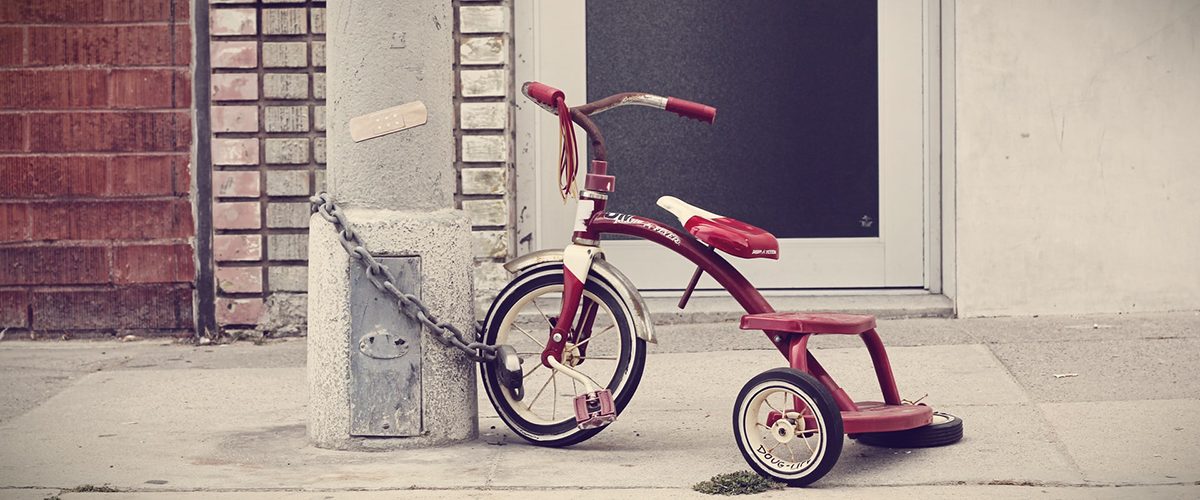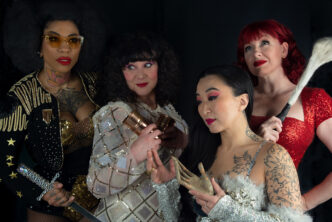A friend of mine once ruined his parents’ Christmas morning by throwing a blue strop because the tricycle they’d saved for months to buy him didn’t have the boot that he’d so clearly explained to them was essential. The boot was the bit where he was going to stash all kinds of interesting stuff he’d find on his travels. Without a boot, the trike was useless, insulting.
When they’d asked him what he wanted for Christmas, they’d heard, ‘a tricycle’. In his mind, what he’d said was, ‘a boot with wheels’. Adults and children inhabit separate worlds, so the words that cross the divide between them often change meaning between lip and ear.
When I was about 5-years-old, my dad gave a me a small penknife.
My dad was a calico printer – a skilled and, sometimes, physically demanding job. His hands were large and muscular; even in later years, his fingers were almost twice the thickness of mine. Lying in his palm, the penknife looked like a shiny sprat. I was delighted.
I don’t think my dad had consulted with my mum about this. I was his lad, and to his way of viewing things, a penknife was something a lad should have.
“Don’t be silly with it,” he warned me. Of course, I wouldn’t be silly with it; it was treasure!
At that moment, I had no idea what to do with it, I only knew I had to try it out. Straightaway. Wouldn’t you?
For the first year or so after its arrival, the magnificent cast metal rocking horse had lived with my grandparents. They had a council house, small but more spacious than our literal two-up-two-down. My grandparents’ own childhoods had been so wretchedly deprived, they must have wanted not only to conserve the most impressive toy they’d ever been close to, but also to share in my pleasure at riding him.

Now, though, my grandparents had moved to Slough, almost two hundred miles south, so the great horse had to be stabled with us; squeezed into a space under the stairs, by the back door.
My mum was in the kitchen, so she hadn’t seen my dad take the penknife from his pocket and give it to me. She was preoccupied, washing and peeling potatoes. I didn’t want to trouble her by asking for something to cut (she might have suggested peeling potatoes!).
To me the grey rocking horse, with its rubber ears, mane and tail and its studded red harness, was simply an old toy. I had a new toy. That was what mattered.
“Don’t be silly with it,” my dad had said when he gave me the knife. I understood perfectly. He meant, of course, ‘don’t break it.’.
I opened up the penknife and moved in, silently. Unnoticed, so I thought.
As she dropped the peeled spuds into a pan, out of the corner of her eye, my mum must have spotted me working away quietly. By now, she knew full well that a quiet child is a child who needs to be carefully surveilled. She asked me what I was doing. Too late. The red plastic harness was hanging loose, neatly severed.
Mum shouted, took the weapon from me (never to be returned), and marched into the living room. A brief row ensued; brief because, beyond shaking his head at me, my dad didn’t have much of a defence to offer.
I felt bad to have caused friction between my parents. I felt guilty, too. My dad had trusted me like a big boy and I’d let him down so immediately and so completely. In barely more than a minute, my day had gone from magical to ruinous. Sent straight up to bed, I was distraught.
Ah, but the way the tiny knife had sliced through that red plastic rein. Thrilling.
Read more about the old rocking horse in Martin’s story Who Was That Pointy-Headed Boy?





